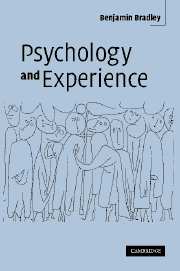Book contents
- Frontmatter
- Contents
- List of illustrations
- Preface
- Acknowledgements
- 1 Introduction
- 2 Learning from experience
- 3 From here to synchrony
- 4 What to make of coincidence
- 5 The topography of intersubjective space
- 6 The two axes of psychological explanation
- 7 Pictures of psychical change
- 8 Research among equals
- 9 Validating the curriculum
- 10 Conclusion
- List of references
- Index
8 - Research among equals
Published online by Cambridge University Press: 22 September 2009
- Frontmatter
- Contents
- List of illustrations
- Preface
- Acknowledgements
- 1 Introduction
- 2 Learning from experience
- 3 From here to synchrony
- 4 What to make of coincidence
- 5 The topography of intersubjective space
- 6 The two axes of psychological explanation
- 7 Pictures of psychical change
- 8 Research among equals
- 9 Validating the curriculum
- 10 Conclusion
- List of references
- Index
Summary
Perhaps there is, properly speaking, no method, but rather a certain way of acting.
(Henri Bergson, 1895, quoted in Hans-Georg Gadamer, Truth and Method, 1989, p. 26)A far-seeing commentary on hopes for a scientific psychology is to be found in Norbert Wiener's (1948) Cybernetics. At the end of a book that in hindsight might seem to have blazed the trail for what we now call cognitive science, Wiener fired a warning shot for all those tempted to venture down that path. This was based on an allegory drawn from Maxwell (1972, p. 309) to show the thermodynamic impossibility of a ‘demon’ who lives on the same scale as the particles it studies being able to draw any valid conclusions about their behaviour.
To succeed, the demon must ‘stand above’ its fellow molecules in order to judge their speed or temperature. Yet the laws of quantum mechanics say that the only way for the demon to get this information is by exchanging energy with its peers. Hence the demon's own speed will be constantly changing as it tries to judge the others’, making it impossible to use its own perceptions as a standard. So ‘in the long run, the demon is itself subject to a random motion corresponding to the temperature of its environment … it receives a large number of impressions, until it falls into “a certain vertigo” and is incapable of clear perceptions. In fact, it ceases to act as a demon’ (Wiener, 1948, p. 58).
- Type
- Chapter
- Information
- Psychology and Experience , pp. 155 - 185Publisher: Cambridge University PressPrint publication year: 2005



